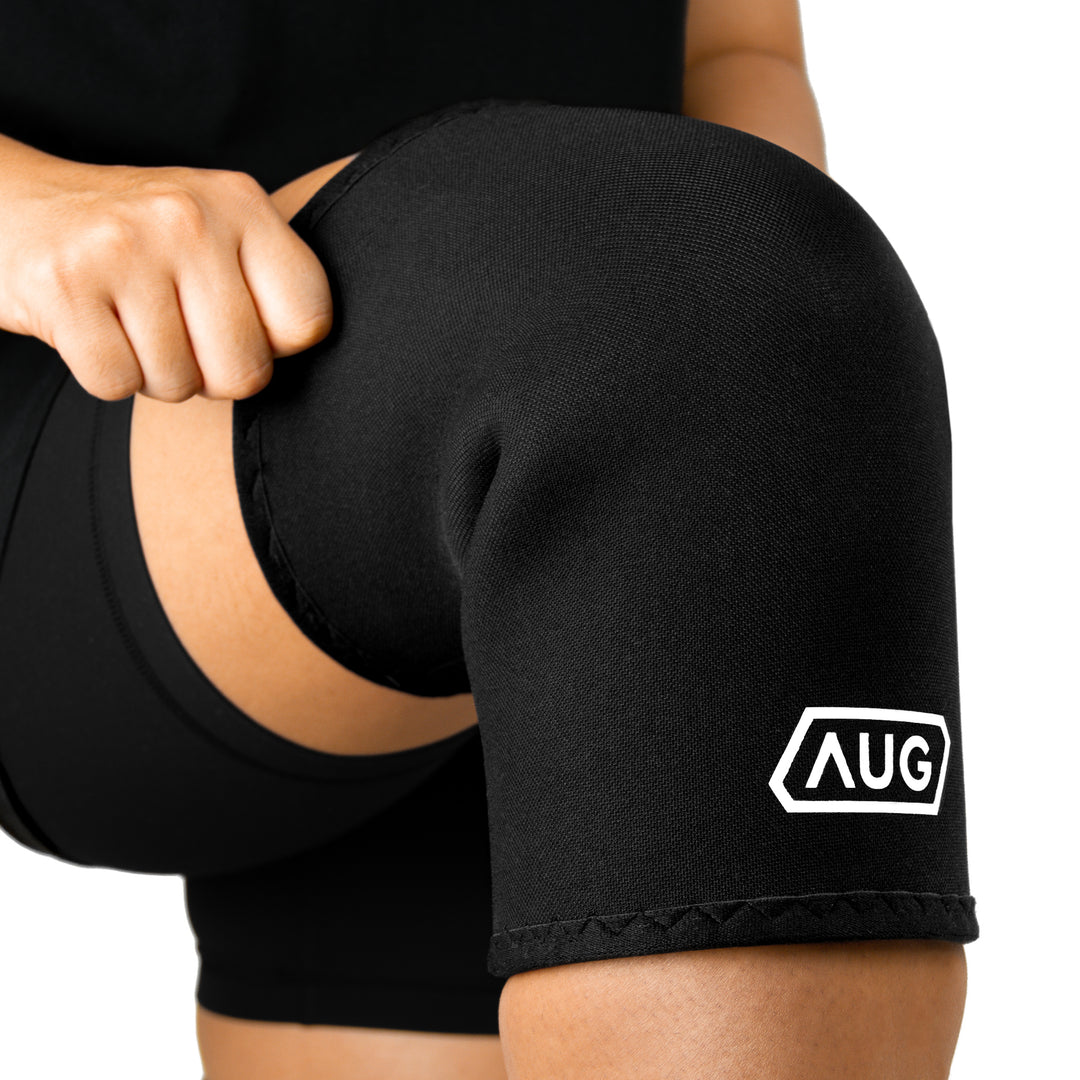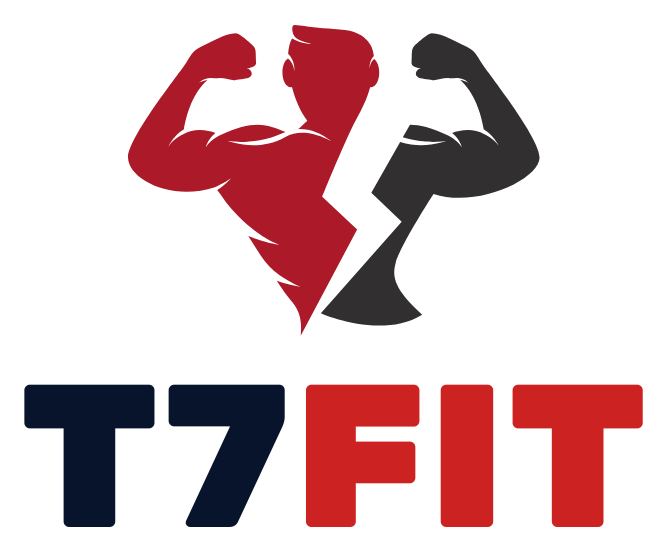Weightlifting knee sleeves provide support and warmth for strenuous lifts. They help stabilize the knee during heavy squats and cleans.
Knee sleeves have become almost ubiquitous in the weightlifting community, serving as a critical accessory for both amateur and professional athletes. Designed to offer compression, they assist in maintaining joint stability and improving blood flow, which can expedite recovery. Often made from neoprene or similar materials, these sleeves fit snugly around the knee.
While they are not a substitute for proper technique, they do offer added confidence through support. As an athlete progresses in their lifting journey, selecting the right knee sleeves becomes essential in any well-equipped gym bag. Their popularity stems not just from potential performance benefits but also from their role in preventive care, potentially reducing the risk of injury.

Credit: augmentstraining.com
The Purpose Of Knee Sleeves In Weightlifting
In the world of weightlifting, knee sleeves serve as both guardians and enhancers of performance. Their role is twofold. They help lifters stay safe and elevate their weightlifting game. This key piece of gear is essential for anyone serious about hitting their peak while safeguarding their knees.
Safety First: Reducing The Risk Of Injury
Safety is a top priority in weightlifting. Knee sleeves are a critical tool in this quest. They provide compression, which increases blood flow and reduces pain and swelling during and after a workout. This support can decrease the risk of strain or injury to the knee.
- Better alignment of the knee joint
- Added support during heavy lifts
- Protection against scrapes and bruises
Performance Boost: How They Can Improve Your Lifts
Many weightlifters find knee sleeves to be a game-changer for enhancing performance. The sleeves can lead to improved mechanics by providing a subtle bounce out of the bottom of a squat.
| Benefits | How They Help |
|---|---|
| Warm Joints | Keeps the knee joints warm, reducing stiffness. |
| Enhanced Proprioception | Improves the awareness of knee positioning. |
| Increased Stability | Provides a sense of stability during lifts. |
Using the right knee sleeve can make a noticeable difference. Lifters often report lifting heavier weights with greater comfort and fewer complications.
Different Types Of Knee Sleeves
Weightlifting knee sleeves come in various materials, thicknesses, and levels of support. Selecting the perfect knee sleeve can enhance performance and protect against injury. Explore the options to find what works best for your training needs.
Material Matters: Neoprene Vs. Fabric Options
Knee sleeves are crafted from different materials, with neoprene and fabric being the most common. Each material offers unique benefits geared towards specific activities and personal preferences.
- Neoprene Sleeves: Provide excellent support, warmth, and compression. Ideal for heavy lifting and high-intensity workouts.
- Fabric Sleeves: Offer more flexibility and breathability. Suited for endurance activities or those looking for a less restrictive fit.
Thickness And Stiffness: What’s Right For You?
Knee sleeve thickness plays a crucial role in the support level provided. Stiffness is key for stabilizing the joint during heavy lifts.
| Thickness | Stiffness | Activity |
|---|---|---|
| 3mm | Low | Running, general fitness |
| 5mm | Medium | CrossFit, moderate lifting |
| 7mm | High | Heavy lifting, Powerlifting |
Explore neoprene for a snug fit that retains heat, aiding in muscle warmth and recovery. Choose fabric sleeves for a lighter, more agile feel during workouts.
Choosing The Right Fit
Lifting heavy demands not only strength but also protection. Knee sleeves are vital for any weightlifter’s gear. The right pair can be the difference between success and unnecessary injury. It’s not just about grabbing any sleeve off the shelf. You need the perfect balance of support and comfort. Find out how to select the size and compression that will amplify your performance.
Size And Compression: Getting It Just Right
Finding your fit starts with accurate measurements. Measure the circumference of your knee at the midpoint where the sleeve will sit. Check this number against the manufacturer’s size chart. A well-fitting knee sleeve should be snug but not constrictive.
- Measure twice, buy once—double-check your measurements for accuracy.
- Consider thickness—5mm is versatile while 7mm offers more support for heavy lifts.
The right compression feels like a firm handshake on your knees. It should enhance blood flow without cutting circulation. If your movements are restricted or the sleeve bunches up, try a different size.
When Tight Is Too Tight: Avoiding Common Mistakes
Too tight and you risk your health. Bad circulation leads to discomfort and defeats the purpose of wearing sleeves. Here’s what to avoid:
- Numb legs or tingling mean your sleeves are too tight.
- Watch for color changes in your skin or swelling below the sleeve.
- Avoid excessive bunching behind the knee, it should not dig into your skin.
Remember, knee sleeves shouldn’t hurt to wear. If you experience pain, re-evaluate your choice. Between sizes? Opt for the larger one—you can always increase tension with careful folds or by adjusting your position.

Credit: www.amazon.com
Proper Use And Maintenance
Weightlifting knee sleeves offer critical support and warmth for your joints. Whether you’re a beginner or a seasoned lifter, knowing how to use and care for your knee sleeves is essential. This ensures they remain effective and last longer.
How To Wear Them Effectively
To get the most from your knee sleeves, follow these simple steps:
- Start with dry skin: Moisture can make it harder to put the sleeves on.
- Roll the sleeve: Turn it inside out and pull it up your leg.
- Position correctly: The thicker part should sit over your knee.
- Smooth out wrinkles: This ensures an even amount of pressure.
- Check fit: Sleeves should be snug but not cut off circulation.
Caring For Your Knee Sleeves: Cleaning And Storage
Maintaining your knee sleeves properly keeps them performing at their best.
| Cleaning | Storage |
|
|
Remember, occasional deep cleaning can eliminate bacteria and odors. Never use bleach or iron your knee sleeves, as this can damage them.
Knee Sleeves Vs. Knee Wraps
When lifting weights, protecting your knees is a top priority. Knee sleeves and knee wraps are popular choices. Each offers distinct benefits. Your selection might change how you perform. Careful comparison ensures the right fit for your goals. Let’s explore the differences.
Comparing Support And Flexibility
Knee sleeves are tubes of neoprene. Knee wraps are long strips of material. Sleeves slide on. Wraps need winding around the knee. Which provides better support?
| Knee Sleeves | Knee Wraps | |
|---|---|---|
| Support | Good | Better for max lifts |
| Flexibility | Higher, allowing movement | Lower, restrict movement |
- Knee sleeves offer consistent, moderate support.
- Knee wraps provide an adjustable tightness for heavy lifting.
Sleeves benefit in everyday training. Wraps aid in breaking personal records.
Choosing Based On Your Training Style
Consider your lifting routine. Is it for general fitness or professional competition?
- For regular gym sessions: Knee sleeves work well.
- For competitive powerlifters: Knee wraps might offer an edge.
Decide on protection or performance. Sleeves protect during diverse activities. Knee wraps push you beyond limits for one-rep maxes.
Quick Tips for Deciding:
- Select sleeves for joint warmth, slight compression, and recovery.
- Go for wraps if peaking for an event.
- Consider comfort, ease of use, and your workout intensity.
Remember to match your choice with your lifting needs. Ask expert trainers too. They can guide you. Good knee support can transform your lifting journey.

Credit: www.amazon.com
Success Stories And Endorsements
Weightlifting knee sleeves garner praise from newcomers and pro athletes alike. Their success stories and endorsements underscore their impact in weightlifting circles. These accessories not only provide essential support during heavy lifts, but they also symbolize a commitment to advancing athletic performance and safety.
Testimonials From Elite Weightlifters
Top weightlifters don’t shy away from sharing their training secrets and gear preferences. Knee sleeves often take center stage in their workout routines. Hear firsthand how these athletes attribute their competitive edge to this critical piece of equipment:
- Jane Doe: “Knee sleeves give me the confidence to push limits.”
- John Smith: “My recovery times improved dramatically with knee sleeves.”
- Alex Lee: “They’re a game-changer for knee stability during squats.”
What The Science Says: Studies On Efficacy
Research aligns with the positive accounts from athletes. Scientific investigations confirm the benefits of knee sleeves. The data points to several key areas:
| Study Focus | Key Findings |
|---|---|
| Joint Support | Knee sleeves enhance joint stability. |
| Injury Prevention | Wearers experience fewer injuries. |
| Performance Improvement | Athletes report increased lift capacities. |
| Recovery Aid | Knee sleeves help reduce post-exercise soreness. |
In conclusion, knee sleeves come with a strong backing from the weightlifting community. Elite athletes and rigorous studies alike champion their efficacy.
Frequently Asked Questions On Weightlifting Knee Sleeves
What Are Weightlifting Knee Sleeves Used For?
Knee sleeves provide support to the knee joint during weightlifting exercises. They enhance stability, warm the joint, and can aid in injury prevention. Their compressive nature can also aid in recovery by reducing swelling and pain post-workout.
How Do Knee Sleeves Improve Lifting Performance?
Weightlifting knee sleeves can increase performance by providing joint warmth and stability. This can lead to improved mechanical support and a psychological sense of security, potentially allowing for increased weight loads and improved technique consistency over time.
Can Knee Sleeves Prevent Weightlifting Injuries?
Knee sleeves are designed to offer support and warmth to the knee, potentially reducing the risk of strain or injury during heavy lifts. However, they are not a replacement for proper technique and training progression.
Do You Need Knee Sleeves For Squats?
While not mandatory, many lifters find that knee sleeves contribute to a safer and more comfortable squat. They help keep the knees warm, provide proprioception, and can slightly aid in knee stability during the exercise.
Conclusion
Embracing the benefits of knee sleeves can elevate your weightlifting journey. These companions offer support, enhanced performance, and injury prevention. Don’t overlook their value in your workout routine. Remember, the right gear can make all the difference. Lift smarter and safer, starting from the ground up.

